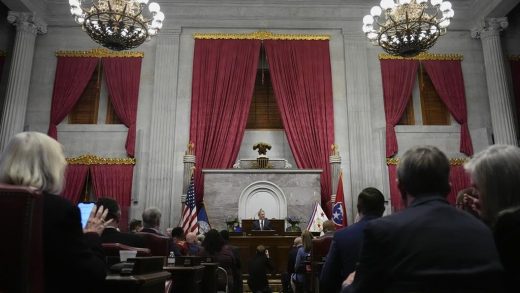
RICHMOND, Va. (AP) — Dominion Energy’s ongoing push for yet another year of legislative tinkering with the way its rates are regulated took a surprise turn this week, when a Virginia House committee whittled down a company-backed bill ratepayer advocates have fiercely opposed.
The vote Thursday afternoon came after Gov. Glenn Youngkin’s administration and the House speaker’s office got involved behind the scenes and then the administration weighed in publicly for the first time on the dispute, which has simmered since before this year’s legislative session officially kicked off.
Del. Terry Kilgore, the sponsor of the House version of the legislation, put forward a new, stripped-down substitute on Thursday, which no longer included a provision that would have increased Dominion’s return on equity, a measure of profitability.

“It’s a simple bill — a lot simpler than it started,” said Kilgore, a longtime ally of Dominion, the parent company of the state’s largest electric utility and Virginia’s largest corporate donor.
Kilgore told the House Commerce and Energy Committee his bill would increase the frequency of Dominion’s rate cases before the State Corporation Commission, moving them from every three years to every two, and would give the commission additional discretion to adjust rates as they see fit.
Kilgore’s bill, like a companion Senate version, initially contained provisions that effectively would have bumped up the return on equity, which is set by the SCC. Dominion has said the change it was seeking was reasonable and would help keep the company competitive as it seeks to raise money for the billions worth of renewable energy projects it has committed to building.
But that proposal drew a backlash from ratepayer advocates and others, who said the legislation was just the latest example of the company trying to use the legislature to meddle with the job of regulators.
The way rates are set for the utility, Dominion Energy Virginia, as well as the authority regulators have to adjust them is a perennial issue at the General Assembly. In recent years, the company has pushed through legislation that minimized the chances that it would have to lower its rates. That’s despite regulators having routinely found that the utility’s rates provide excessive profit.
“We have monopolies in Virginia. The role of monopoly regulators is to make sure that power prices are fair. And when the monopoly utility gets to dictate its own profit margins, that takes away the regulators’ power to ensure that customers are treated fairly,” Will Cleveland, an attorney for the Southern Environmental Law Center, said in an interview earlier this week.
The law center is among a coalition of environmental groups, big businesses and ratemaking reform groups have been opposing the legislation. A council of the AFL-CIO has joined Dominion in backing the bill.
Also gone from Kilgore’s latest bill is a provision that involved rolling $300 million worth of charges in what are called rate adjustment clauses, or riders, into base rates. The company had pitched doing so as a way to lower customers’ monthly bills.
Travis Voyles, Youngkin’s acting secretary for natural and historic resources, said Kilgore’s amended measure and two separate rate-related measures intended to shore up the State Corporation Commission’s authority that advanced Thursday were priorities for the governor.
Altogether, the bills “present straightforward, foundational and commonsense ways to move the conversation on energy forward and target processes to improve predictability, accountability and the restoration of the SCC’s independent authority. An appropriate balance is needed,” Voyles said.
A representative of Attorney General Jason Miyares, whose office represents the interests of consumers in SCC proceedings, also backed Kilgore’s amended bill.
A Dominion lobbyist, Katharine Bond, said of the amended Kilgore bill that the company was “supportive of it moving through this process” and urged its passage.
“We continue to support comprehensive legislation that provides immediate relief for our customers, stronger SCC authority and a simpler regulatory process. We appreciate the process moving forward and will continue working with all the stakeholders,” Dominion spokesman Aaron Ruby said Friday.
Longtime observers of energy policy said the moment marked a stark departure for a committee where Dominion-backed measures typically sail through.
“From what Dominion asked for at the beginning to what it appears they’re going to get, I’m not sure we’ve ever seen a move like that, certainly not in my time in energy policy or in the General Assembly,” said Greg Habeeb, a former Republican House member and now a lobbyist whose firm represents a variety of clients who opposed the legislation as it was introduced.
The focus now turns to the Democrat-controlled Senate, where that chamber’s version cleared a committee last week after about 15 minutes of discussion but has been stalling on the floor for several days rather than being advanced to a final vote. That could now could happen early next week.
Another powerful Dominion ally, Senate Majority Leader Dick Saslaw, is carrying his chamber’s version.
Saslaw’s bill has been through some amendments but is closer to the versions he and Kilgore introduced than the current House bill.
His version also would also allow the company to issue bonds to spread out upcoming fuel cost increases — which the company says are attributable largely to the war in Ukraine — over a 10-year period, adding interest but averting customers from bearing the spike all at once.
“The goal is to have more affordable rates while enabling investments that are needed to be made to the electric grid with the new sources of power that they’re currently working on,” Saslaw said of his version as a whole earlier this week in a committee hearing.
Dominion has long been a powerhouse at the state Capitol, where it currently employs or retains more than two dozen lobbyists.
In the month of January before the session began, the company donated over $300,000 to lawmakers, leadership caucuses and political action committees, according to records maintained by the nonpartisan Virginia Public Access Project.
“We contribute equally to candidates from both parties in support of public policy that promotes affordable, reliable and clean energy,” Ruby said.


